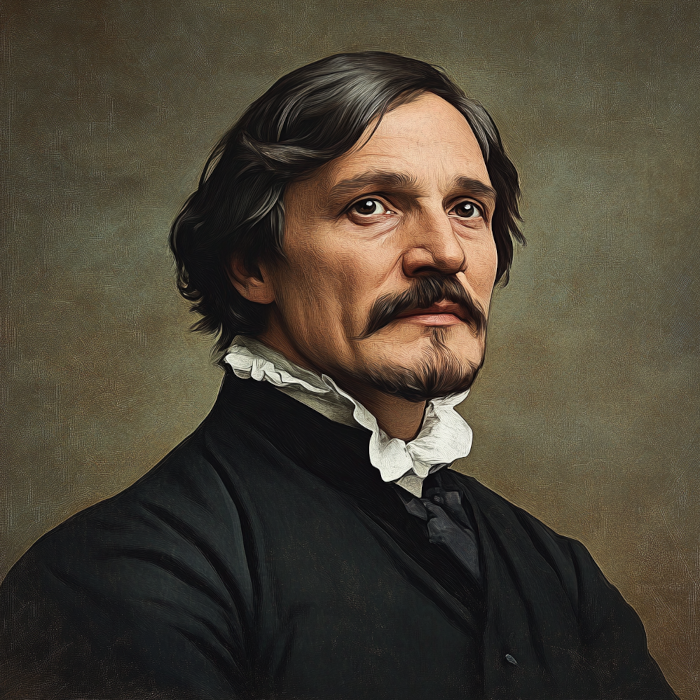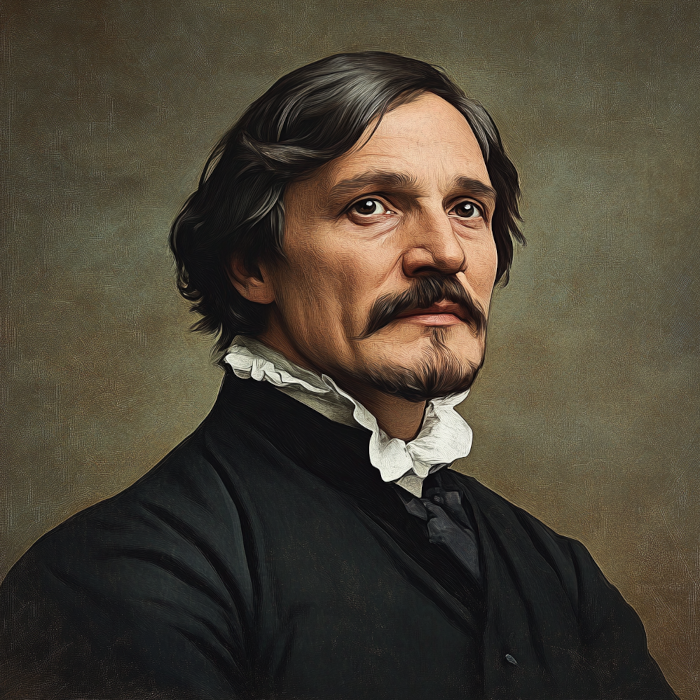


Nikolai Vasilyevich Gogol (1809–1852) was a Russian writer, playwright, and satirist, considered one of the most important figures in Russian literature and a pioneer of the realist movement. Gogol's unique blend of satire, fantasy, and grotesque humor profoundly influenced Russian writers, including Fyodor Dostoevsky and Nikolai Chernyshevsky, who saw him as a key figure in establishing Russian literary identity. Some of his most famous works, such as "The Government Inspector" and "The Overcoat", critiqued the absurdities of bureaucracy and societal flaws, and his novel "Dead Souls" offered a satirical exploration of Russian life and character.
Birth and Background: Nikolai Gogol was born on March 31, 1809, in the village of Sorochyntsi, then part of the Russian Empire. He grew up in a family of minor landowners in the Poltava province, an area that had a rich cultural and folkloric tradition. Gogol’s mother was deeply religious, and his father, Vasyl Gogol-Yanovsky, was a poet and playwright, who instilled in him a love of storytelling and the arts from an early age. The Ukrainian culture and folklore of his childhood had a profound influence on Gogol's later work.
Education: Gogol attended Nezhin Gymnasium (a secondary school) from 1821 to 1828, where he was known for his theatrical performances and early attempts at writing. He was not an outstanding student, but he showed interest in literature, drama, and languages. After finishing school, he moved to St. Petersburg in 1828 with hopes of pursuing a career in literature or government service.
Arrival in St. Petersburg: Upon arriving in St. Petersburg, Gogol struggled to establish himself. He initially took a minor government job, but soon turned his attention to literature. His first published work, "Hans Küchelgarten" (1829), a romantic poem inspired by German literary traditions, was poorly received by critics. This failure led Gogol to buy and destroy all remaining copies of the work.
Success with Ukrainian Tales: Gogol's first major literary success came in 1831 with the publication of "Evenings on a Farm Near Dikanka", a collection of short stories inspired by Ukrainian folklore and the customs of rural life. The stories, including "The Night Before Christmas" and "St. John's Eve," were celebrated for their vivid descriptions, humor, and supernatural elements, and established Gogol's reputation as a major new voice in Russian literature. His writing skillfully blended fantasy and realism, creating a distinctive atmosphere that would become a hallmark of his style.
"Mirgorod" (1835): In 1835, Gogol published "Mirgorod", a collection of stories that included "The Tale of How Ivan Ivanovich Quarreled with Ivan Nikiforovich", a humorous portrayal of small-town disputes, and "Taras Bulba", a historical novella about Cossack culture that depicted the bravery, traditions, and tragic heroism of the Ukrainian Cossacks. "Taras Bulba" showcased Gogol's fascination with history and culture and is one of his most famous works.
"The Government Inspector" (1836): "The Government Inspector" is one of Gogol's most significant and enduring works. This satirical play, which premiered in 1836, was a scathing critique of the corruption and incompetence of local government officials in Imperial Russia. The plot revolves around a small-town mayor and officials who mistake a visiting traveler for a government inspector sent to evaluate them, leading to a series of comic misunderstandings. The play exposed the absurdity of bureaucratic incompetence and self-serving behavior, resonating deeply with audiences and critics alike, and earning Gogol a reputation as a master satirist.
"The Petersburg Tales" (1835–1842): Gogol wrote several stories that depicted life in St. Petersburg, collectively known as "The Petersburg Tales". These stories included "Nevsky Prospekt", "The Nose", and "The Overcoat". These works combined realism with elements of the fantastic and grotesque, exploring themes such as alienation, bureaucratic absurdity, and the human condition.
"Dead Souls" (1842): "Dead Souls" is Gogol's masterpiece and his most ambitious work, published in 1842. The novel follows the adventures of Pavel Ivanovich Chichikov, who travels around rural Russia buying the "souls" of deceased serfs from landowners to exploit a bureaucratic loophole and gain wealth. Through Chichikov's encounters with various landowners, Gogol paints a vivid and often grotesque picture of Russian society, satirizing greed, corruption, and the decaying moral fabric of the landowning class. Although "Dead Souls" was intended to be the first part of a trilogy, Gogol struggled with completing the second volume, and it was never finished. The novel’s mix of satire and tragedy, combined with its portrayal of the Russian character, makes it one of the foundational texts of Russian literature.
Religious Turn and Crisis: In the late 1830s, Gogol began experiencing a profound spiritual crisis. He became increasingly interested in religion and mysticism, and this shift in his worldview had a significant impact on his later writing. He traveled extensively across Europe, spending time in Rome, where he wrote parts of "Dead Souls." Gogol's religious concerns deepened, and he became obsessed with questions of morality and salvation.
Struggles with "Dead Souls" Second Part: Gogol worked for years on a second volume of "Dead Souls", intended to show the possibility of redemption for his characters. However, he was dissatisfied with his work and believed that he had not lived up to his artistic or spiritual ideals. In a dramatic gesture, he burned much of the manuscript in 1852, an act that shocked his friends and supporters.
Death: Gogol died shortly afterward, on March 4, 1852, in Moscow, at the age of 42. In the final weeks of his life, he suffered from physical and mental health issues, exacerbated by fasting and self-denial. His exact cause of death remains unclear, but it is believed to have been a combination of starvation, illness, and emotional turmoil. His death left much of his later work incomplete, including the second volume of "Dead Souls."
Pioneer of Russian Realism and Satire: Nikolai Gogol is regarded as one of the founders of Russian realism and a master of satire and the grotesque. His works highlighted the absurdity of Russian bureaucracy and the social ills of his time, often using humor and the supernatural to expose the flaws and hypocrisy of society. His unique blend of fantasy, satire, and emotional depth laid the foundation for the realist movement in Russian literature.
Influence on Future Writers: Gogol's influence on Russian literature was profound. He is often credited with shaping the works of the great Russian authors who came after him, including Fyodor Dostoevsky, Leo Tolstoy, and Anton Chekhov. Dostoevsky famously declared that "we all came out from under Gogol's 'Overcoat'," emphasizing the significance of Gogol's work in defining the themes and style of Russian literature. His exploration of the human psyche, bureaucracy, and social injustice paved the way for future writers to delve deeper into the human condition.
Themes of Alienation and Bureaucracy: Gogol's works often depicted the plight of individuals caught in the indifferent machinery of government and society. Characters like Akaky Akakievich from "The Overcoat" and the officials in "The Government Inspector" became symbols of the alienation and oppression faced by ordinary people. These themes resonated deeply with readers in Russia and beyond, making Gogol a central figure in the development of socially conscious literature.
The Grotesque and the Absurd: Gogol’s use of the grotesque and the absurd to critique society and human nature set him apart from his contemporaries. Stories like "The Nose" showcased his ability to combine the ridiculous with biting social commentary, creating a sense of surrealism that highlighted the irrationality of human behavior and social institutions. This element of his writing influenced not only Russian literature but also later movements like modernism and absurdist fiction.
Impact on Theatre and Drama: Gogol's play "The Government Inspector" remains one of the most famous Russian comedies and is still performed today. It had a significant influence on the development of Russian drama, inspiring playwrights such as Anton Chekhov. The play's satirical portrayal of corrupt officials and the fear of authority continues to resonate with audiences worldwide.
Nikolai Gogol was a pivotal figure in the evolution of Russian literature, whose works combined satire, fantasy, and social criticism to expose the absurdities and flaws of society. His major works, including "The Government Inspector", "The Overcoat", and "Dead Souls", remain timeless explorations of human nature, bureaucracy, and the struggle for meaning in a complex world. Gogol's unique voice and perspective laid the foundation for the realist tradition in Russian literature and inspired generations of writers who followed.
Gogol's ability to blend the grotesque with the profoundly human made his works both entertaining and deeply insightful, capturing the essence of Russian society in the 19th century. Though he faced personal struggles and spiritual crises, his literary legacy endures as a testament to his remarkable talent and his influence on the world of literature. Gogol's works continue to be read, studied, and performed, ensuring his place as one of the most important writers of his time.

We use cookies
We use cookies and other tracking technologies to improve your browsing experience on our website, to show you personalized content and targeted ads, to analyze our website traffic, and to understand where our visitors are coming from. Privacy Policy.